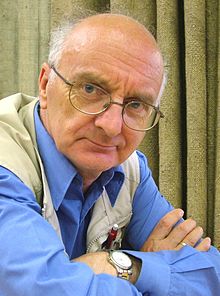
Gerrit Berveling (born 1 April 1944, Vlaardingen) is a Dutch Esperanto author.

Gerrit Berveling (born 1 April 1944, Vlaardingen) is a Dutch Esperanto author.
He studied Classical Languages (Latin and Greek) at Leiden University, and Theology at Utrecht and Leiden Universities. After 14 years of teaching general history and classical languages, he worked 14 years as a Remonstrant minister in different liberal Christian communities, and now is teaching classical languages again.
In Esperanto he is known as an original Esperanto poet, but mostly as a translator from Latin, Greek and Dutch. Besides, he is editor of a literary Esperanto revue, Fonto, appearing every month in Brazil.
He is one of many Esperantists who have joined the Esperanto Wikipedia. Along with fellow-Wikipedians John C. Wells and Bertilo Wennergren, a notable Esperanto grammarian [1] and the director of the Academy's section about Esperanto vocabulary, Berveling is a member of the Academy of Esperanto.
You can find translations of Gerrit Berveling: